

Reliable method detects suicidal propensity: Reliable method detects suicidal propensity: Research. A simple measurement of the sweat gland activity of a depressed person can determine if he or she is suicidal – with 97 per cent accuracy.
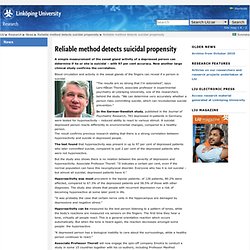
Now another large clinical study confirms the correlation. Blood circulation and activity in the sweat glands of the fingers can reveal if a person is suicidal. First Major Study of Suicide Motivations to Advance Prevention : News : ParentHerald. (Photo : Flickr) First Major Study of Suicide Motivations to Advance Prevention A University of British Columbia study sheds important new light on why people attempt suicide and provides the first scientifically tested measure for evaluating the motivations for suicide.
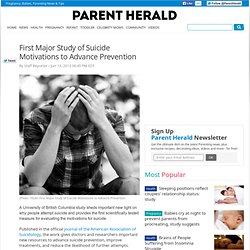
Published in the official journal of the American Association of Suicidology, the work gives doctors and researchers important new resources to advance suicide prevention, improve treatments, and reduce the likelihood of further attempts. Like Us on Facebook "Knowing why someone attempted suicide is crucial - it tells us how to best help them recover," says Prof. David Klonsky, UBC Dept. of Psychology. The study, based on 120 participants who recently attempted suicide, suggests many motivations believed to play important roles in suicide are relatively uncommon.
"It may be surprising to some, but focusing on motivations is a new approach in the field of suicide research - and urgently needed," says Klonsky. Predictors of suicidal behaviour found in blood. Hikrcn/Shutterstock More people with suicidal thoughts might find help in time if doctors were able to test them for molecular signs, or biomarkers, of heightened risk.

People who are intent on taking their own life may not seek counsel or discuss their thoughts with others. Two to four cups of caffeinated coffee per day linked to lower suicide. BOSTON, July 28 (UPI) -- Drinking a few cups of coffee daily appears to reduce the risk of suicide in men and women by about 50 percent, U.S. researchers say.
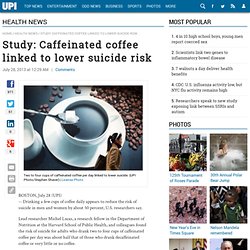
Lead researcher Michel Lucas, a research fellow in the Department of Nutrition at the Harvard School of Public Health, and colleagues found the risk of suicide for adults who drank two to four cups of caffeinated coffee per day was about half that of those who drank decaffeinated coffee or very little or no coffee. Caffeine not only stimulates the central nervous system but may act as a mild anti-depressant by boosting production of certain neurotransmitters in the brain, including serotonin, dopamine and noradrenaline, Lucas said. The authors did not recommend depressed adults increase caffeine consumption because most individuals adjust their caffeine intake to an optimal level for them and an increase could result in unpleasant side effects, Lucas said.
Inflammation chemical linked to suicide. MICHIGAN STATE (US) — Scientists report the first proof that a chemical in the brain called glutamate is linked to suicidal behavior—findings that offer new hope for prevention.

Writing in the journal Neuropsychopharmacology, Michigan State University’s Lena Brundin and a team of co-investigators present the first evidence that glutamate is more active in the brains of people who attempt suicide. Glutamate is an amino acid that sends signals between nerve cells and has long been a suspect in the search for chemical causes of depression. Scientists pursue suicide blood test. A blood test may be able to tell if a person is suicidal.
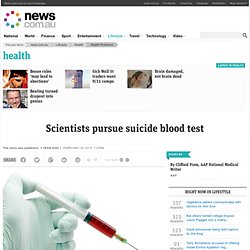
Picture: Thinkstock Source: Supplied AUSTRALIAN scientists are helping to develop a blood test that could determine if people are suicidal. Jumpers. Shortly after ten-thirty in the morning on Wednesday, March 19th, a real-estate agent named Paul Alarab began hiking across the Golden Gate Bridge.

Midway along the walkway, which carries pedestrians and cyclists between San Francisco and Marin County, he stopped and climbed the four-foot safety railing. Then he lowered himself carefully onto the bridge’s outermost reach, a thirty-two-inch-wide beam known as “the chord.” It is on the chord, two hundred and twenty feet above San Francisco Bay, that people intending to kill themselves often pause. On a sunny day, as this day was, the view is glorious: Angel Island to the left, Alcatraz straight ahead, Treasure Island farther off, bisecting the long gray tangent of the Bay Bridge, and, layered across the hills to the south, San Francisco. Alarab turned and looped a thick rope over the railing, then wound it around his right wrist five times and grabbed it with his gloved right hand. Gay-straight alliances in schools reduce suicide risk for all students.
Photo: Renee Brown, iStock.
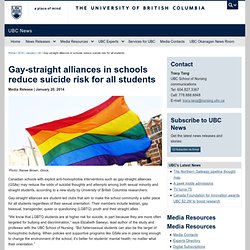
Canadian schools with explicit anti-homophobia interventions such as gay-straight alliances (GSAs) may reduce the odds of suicidal thoughts and attempts among both sexual minority and straight students, according to a new study by University of British Columbia researchers. Gay-straight alliances are student-led clubs that aim to make the school community a safer place for all students regardless of their sexual orientation. Their members include lesbian, gay, bisexual, transgender, queer or questioning (LGBTQ) youth and their straight allies. “We know that LGBTQ students are at higher risk for suicide, in part because they are more often targeted for bullying and discrimination,” says Elizabeth Saewyc, lead author of the study and professor with the UBC School of Nursing.
“But heterosexual students can also be the target of homophobic bullying.